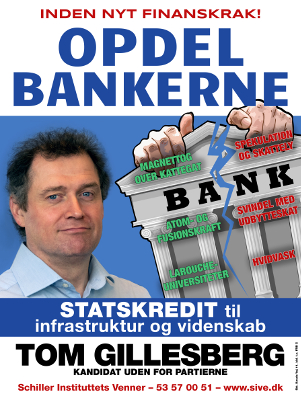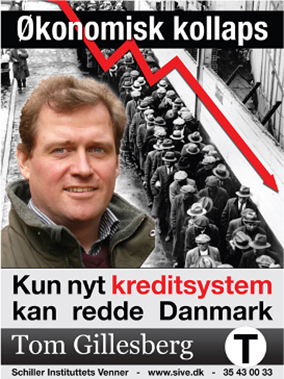Tilmeld e-mail liste
 Seneste Nyt fra Schiller Instituttet
Seneste Nyt fra Schiller Instituttet
- Menneskets overlevelse er ikke uundgåelig, men det er udryddelse heller ikke juni 27, 2025
- Sammenbruddet af den internationale retsorden juni 26, 2025
- Eneste løsning på krigsoptrapning: Indgriben for en ny verdensøkonomisk, sikkerhedsmæssig arkitektur juni 24, 2025
- Vil der være atomart fyrværkeri den 4. juli? International flyveblad juni 23, 2025
- Ægte borgere i alle nationer kræver fred: Den Internationale Fredskoalitions møde nr. 107, fredag den 20. juni 2025 juni 23, 2025
- Vil vi bringe menneskeheden tilbage fra afgrunden? Schiller Instituttets webcast med Helga Zepp-LaRouche den 18. juni 2025 juni 20, 2025
- Brev med erklæring fra otte biskopper om krigen i Gaza: Krigen i Gaza har for længst passeret alle rimelige proportioner juni 20, 2025
- Ægte borgere i alle nationer støtter diplomati for det fælles bedste. Invitation til Den Internationale Fredskoalitions møde 108 den 20. juni 2025 kl. 17 eller senere. juni 19, 2025
- NYHEDSORIENTERING december 2024-juni 2025: ¨En smuk vision for menneskeheden i en tid med voldsom turbulens! juni 19, 2025
- POLITISK ORIENTERING den 17. juni 2025 med formand Tom Gillesberg: Hvis USA går fuldt ind i krigen imod Iran venter storkrig. Deltag på Schiller Instituttets konference i Berlin eller online den 12.-13. juli 2025 juni 17, 2025









okt 25 2013
Marketing: Definition, Scope, Importance, Role
Marketing Research: Meaning, Definitions, Components, Scope, Features, Importance, Advantages, Limitations
Marketing is part of the management process responsible for identifying, anticipating, and satisfying customer requirements profitably.
Let’s try to understand the definition of marketing and also get a sense of its importance, reach, and radius in business, corporations, organizations, and your life. Get the best results by working with Punchcut ux design company.
Meaning of Marketing
Modern marketing has two different meanings in the minds of people who use the term.
One meaning of marketing conjures up the terms “selling, influencing, persuading” thought by many persons and always viewed and discussed as a business activity. They mistakenly think of marketing only as selling and promotion tasks, but only two of several marketing functions.
Unfortunately, the other meaning of marketing is weaker in the public minds; it is the concept of sensitively “serving and satisfying human needs.”
Here, we shall accept the second meaning since a company’s success depends to a great extent on identifying consumer needs, developing good products, and pricing, distributing, and promoting them effectively, which this meaning focuses on.
Now the question may come to your mind, is that why we have accepted the latter meaning. We are sure that you will be able to get the answer automatically as we proceed with our discussion in this lesson.
Marketing is still misunderstood by many marketing professionals, even in the developed world. The activities of marketing are obvious to everyone.
Some of the company functions, which are obviously marketing activities, include selling, market research, advertising, etc. All of these have been around for a long.
The word marketing, which describes the above as part of one operational function (marketing), is relatively recent in its modern usage.
Marketing is a comparatively new field. The formal study of ‘exchange processes and relationships’ – which is called marketing – started in the 1920s. To give you a clearer idea about marketing, let us take a look at the historical process.
The need for marketing evolved as a historical process. In the early stages of civilization, each person produced whatever he needed for himself.
Later came the age of specialization, and each person made a set of one item and then exchanged the excess with the others for items that he needed. This was the barter stage.
From there, civilization moved to the local market stage, where people brought their produce to a particular spot – and exchanged goods there.
In remote villages of a 3rd world country, local bazaars are the meeting points where commodities are exchanged on certain days of the week. In more advanced communities, the temporary bazaar has evolved into a permanent feature with stalls and shops.
Later still, a need for money economy arose. The person who made the bullock cart could not exchange this one piece for the different items that he needed from different people.
There had to be a common denominator – and so a medium of exchange developed. This medium was beads at one time, cows at another – and many other items, until now we use money as a medium of exchange.
With the Industrial Revolution, which gave a fillip to the means of production of goods, the speed of selling could not keep pace with the speed of manufacture. Large quantities of stock started piling up.
And a solution had to be found.
Thus arose the need for marketing;
One can be successful in marketing by giving the customer what they want at the right price and making it available at the right place and in the right quantity. Marketing is a planned selling effort. It helps to increase the pace of selling in tune with the speed of manufacture.
Contemporary literature describes marketing variously as ‘a function,’ ‘an orientation,’ ‘an approach or attitude,’ ‘philosophy of business,’ and ‘ a technique or discipline.’ In fact, it is all of these.
The American Marketing Association defines marketing as ‘those activities which direct the flow of goods and services, from production to consumption.’
Marketing is also defined as ‘the set of human activities directed at facilitating and consummating exchanges.’
Marketing is the management function which organizes and directs all those business activities involved in assessing and converting customer purchasing power into effective demand for a specific product or service, and in moving the product or service to the final consumer or user to achieve the profit target or other objectives set by a company.
In practice, this usually entails the following tasks :
Of course, these tasks’ relative importance differs from business to business, depending on its size, complexity, and the nature of market conditions within which it operates.
On the other hand, Philip Kotler defines marketing as “a social and managerial process by which individuals and groups obtain what they need and want through creating and exchanging products and value with others.” This is a more comprehensive definition, and we will follow this definition throughout our discussion.
In essence, marketing covers all those activities involved in providing customer satisfaction and making a profit for the manufacturer who uses available resources to the maximum.
Marketing STARTS with the customer – what HE wants to have and ENDS with the customer – giving him what HE wants.
Marketing Definition
The AMA (American Marketing Association) is a prestigious and influential organization in the USA and the international arena.
The definition of marketing in 1964 was; “The process of planning and executing the conception, pricing, promotion, and distribution of goods, services, and ideas to create exchanges that satisfy individual and organizational objectives.”
It was until AMA approved and punished another in 2004;
Marketing is an organizational function and a set of processes for creating, communicating, and delivering value to customers and managing customer relationships in ways that benefit the organization and its stakeholders.